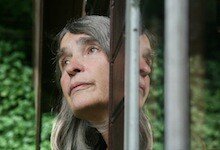Listening with “all my ears”
“The key to his world, or, it may better be said, to the understanding of the place of the misunderstanding in his world: someone approaches someone else until an encounter, which is built on a paradox and leads to a pointed observation.”
When Dan Pagis’ Collected Poems appeared at the end of 1991, it was obvious to readers, if not completely taken for granted, that it was the work of a great poet, one of the greatest of recent generations. One almost forgets that until his death five years earlier, not only was his greatness not taken for granted, but most people had failed to perceive it. Even those familiar with his work placed it in the margins rather than with the mainstream. His voice was quiet, almost innocent, in the face of the foaming waves of 1960s Hebrew modernism, and modernism’s revolution in form, as well as the revolutionary changes in the characters who figured in it.
Neither closemindedness nor historical injustice was to blame here, but misunderstanding, or an inability to understand. Pagis’ early poetry grew out of the Romantic and German traditions of the early twentieth century, and whose tone somewhat recalled that of Lea Goldberg. This kind of poetry disappeared into that of the generation [preceding Hebrew modernism], and seemed irrelevant. Pagis’ clarity, stemming from his life experiences and constructed out of poetic attachments he developed during his formative years, went almost unnoticed. Although one finds lines that are clearly in the style for which Pagis’ is now well known in a few poems and in the title of his first book, Shaon Hatsel (Shadow Clock, 1959), at the time that the book appeared, there was something that seemed almost banal, even sentimental about it.
[ . . . ]
Today, without [being under pressure to apply] the standards of that era, it is easier to see how sharp and penetrating these poems are. And another element must be mentioned: the intellectual world approached in these poems was a kind of no-man’s-land in Hebrew poetry at the time. [ . . . ] There are experiments with Dinggedichte (thing-poems) that Rilke developed and brought to perfection, and which carry on a poetic dialogue with the German Romantic and neo-Romantic poetry that preceded them. Pagis took a great interest in this dialogue and even more in the possibility of expressing them in Hebrew.
[ . . . ]
It soon becomes clear to readers of Pagis’ earlier work that it bears no trace of roughness or immaturity, because from the beginning he evinced a virtuosic control of the concentrated, economical and self-sufficient patterns of poetry. [ . . . And] it is also clear that most of the drama in the world [of his early poems] still takes place in the ‘foreign’ German cultural landscape (which was not at all foreign to him; to Pagis, it was his home and homeland in the most productive meaning of these words, even if it became a complex and ambivalent presence afterwards in the Nazi period). [For example,] most of the tension in Pagis’ ‘Noflim Metsuk’ (Falling off a Cliff) is created by its connection to a poem by Hölderlin, but in 1959 [ . . . ] this tension was hidden from [Israeli] readers.
[Pagis’ signature style] is unprecedented. It is an original Pagis creation, and an understanding of it is the key to his world, or, it may better be said, to the understanding of the place of the misunderstanding in his world. One example of this is the poem ‘The Last Ones’:
I am already quite scarce. For years
I have appeared only here and there
at the edges of the jungle. My graceless body,
well camouflaged among the reeds, clings
to the damp shadow around it.
Had I been civilized,
I would never have been able to hold out.
I am tired. Only the great fires
still drive me from hiding place to hiding place.
And what now? My fame is only in the rumors
that from time to time
and even from hour to hour
I’m shrinking.
But it is certain that at this very moment
someone is tracking me. Cautiously
I prick all my ears and wait. The steps
already rustle the dead leaves. Very close. Here.
Is this it?
There is no time to explain.
(translation by Stephen Mitchell)
It is easy to sense when reading this poem that the speaker, one of the “last ones”, is depicted as a primitive animal or human being in a process of dying out which continues throughout the poem. We are informed at the beginning that the long process is about to come to an end: “I am already quite scarce”. But in addition to the speaker, there are other presences: things, powers and an Other, a fellow human. Someone is looking for him, “tracking” him, and large fires drive him from one hiding place to another. So there are two elements in the process: the walking, diminishing self, and the Other who increases as he approaches. The second stanza quickens the pace “from time to time/ and even from hour to hour/ I’m shrinking”. It seems that he will become nothing very soon, although at the same time it is clear that this is his beginning; that is to say, someone else knows about him and gives meaning to his existence.
Near the end of the poem, the speaker hears the voice of the Other approaching and senses its presence, and his relation to the Other changes throughout. At the beginning he was afraid of great forces (of nature, uncivilised conditions, fires), and afterwards acknowledges the presence of the Other (“But it is certain that at this very moment/ someone is tracking me”), and responds: he does not disappear or escape, but pricks up “all my ears” and waits. The speaker changes his nature and character before his encounter with the approaching Other. Suddenly he has many ears and not just a “graceless body”. The fact that this abundance of ears is discovered exactly at this time is significant. There will be communication between the speaker and the Other. The poem, which produces a kind of detective-story tension, reaches a surprising ending, a sort of sharp punch line: this Other who comes from the outside world, from out there to the self, is none other than the speaker himself.
It is of course possible to read this poem as taking place entirely as an internal monologue, as though the speaker and the Other who approaches him are two parts of one personality: the childish, naïve and primitive part facing the intellectual, mature, civilised one, a kind of jungle scientist hunting a rare animal which is nothing other than his childish self.
Readers may be surprised to learn that this kind of structure appears in other of Pagis’ poems too, ones that do not deal with the life of the soul, or at least not so overtly. This plot, in which someone approaches someone else until there is an encounter which is built on a paradox and leads to a pointed observation, is a basic structure in Pagis’ work.
Ariel Hirshfeld is an author, scholar, and senior lecturer in Hebrew literature at the Hebrew University of Jerusalem.
Excerpted from the afterword to Lev Pitomi (Am Oved Press, Tel Aviv, 1995), a biography of Dan Pagis by his wife, Ada Pagis.








